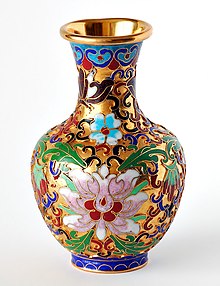vase
English
[edit]
Etymology
[edit]Borrowed from Middle French vase, from Latin vās. Doublet of vas.
Pronunciation
[edit]- (Received Pronunciation) IPA(key): /vɑːz/, (obsolete) /vɔːz/
- Rhymes: -ɑːz
- (General American) IPA(key): /veɪs/, /veɪz/, /vɑz/, (obsolete) /vɔz/[1]
- (General Australian) IPA(key): /vɐːz/, /væes/
- (Canada) IPA(key): [veːz], [väːz], [vaz], [-s], [vɒːz]
- Rhymes: -eɪs
Usage notes
[edit]There is some tendency in American English to use the pronunciation /vɑz/ for more expensive and/or elegant items, and /veɪs/ for more everyday ones.
Noun
[edit]vase (plural vases)
- An upright open container used mainly for displaying fresh, dried, or artificial flowers.
- a vase of flowers
- (architecture) The body of the Corinthian capital.
Derived terms
[edit]Translations
[edit]
|
Verb
[edit]vase (third-person singular simple present vases, present participle vasing, simple past and past participle vased)
- (transitive) To place in a vase or similar container.
- 2009, Emily Bobo, Marvin Bell, Fugue, page 21:
- She bought only pastel pencils and vased them in cups, great wooden bouquets in mugs on nightstands and kitchen chairs.
- 2021, Christine DePetrillo, Wolf Love, page 172:
- After she'd finished, she picked a bouquet of wildflowers and vased them in an old mason jar. That seemed a fitting centerpiece for the table.
References
[edit]- ^ Krapp, George Philip (1925) The English Language in America[1], volume II, New York: Century Co. for the Modern Language Association of America, →OCLC, page 49.
Anagrams
[edit]Danish
[edit]Etymology
[edit]Borrowed from French vase, from Latin vās (“vessel”).
Pronunciation
[edit]Noun
[edit]vase c (singular definite vasen, plural indefinite vaser)
Declension
[edit]References
[edit]- “vase” in Den Danske Ordbog
French
[edit]Pronunciation
[edit]Etymology 1
[edit]From Middle French, from Middle Dutch wase (“mud, silt, wet ground, clod of dirt, grass”), from *Old Dutch waso, from Proto-Germanic *wasô (“moisture, ground”), from Proto-Indo-European *wes- (“moist, wet”). More at ouze.
Noun
[edit]vase f (plural vases)
Derived terms
[edit]Etymology 2
[edit]Inherited from Old French, borrowed from Latin vās.
Noun
[edit]vase m (plural vases)
Derived terms
[edit]Descendants
[edit]Further reading
[edit]- “vase”, in Trésor de la langue française informatisé [Digitized Treasury of the French Language], 2012.
Latin
[edit]Noun
[edit]vāse
Norman
[edit]Etymology
[edit]Noun
[edit]vase m (plural vases)
Norwegian Bokmål
[edit]Etymology
[edit]From Latin vas, via French vase and German Vase.
Noun
[edit]vase m (definite singular vasen, indefinite plural vaser, definite plural vasene)
- a vase
References
[edit]- “vase” in The Bokmål Dictionary.
Norwegian Nynorsk
[edit]Etymology
[edit]From Latin vas, via French vase and German Vase.
Noun
[edit]vase m (definite singular vasen, indefinite plural vasar, definite plural vasane)
- a vase
References
[edit]- “vase” in The Nynorsk Dictionary.
Pali
[edit]Alternative forms
[edit]Noun
[edit]vase
Verb
[edit]vase
- imperative active second-person singular of vasati (“to dwell”)
- imperative active second-person singular of vasati (“to clothe”)
Swedish
[edit]Pronunciation
[edit]Audio: (file)
Noun
[edit]vase c
- sheaf, nowadays mostly as a heraldic symbol. Used in the coat of arms of the House of Vasa ruling Sweden 1523–1654
- (Gothenburg dialect) small boy
Anagrams
[edit]- English terms borrowed from Middle French
- English terms derived from Middle French
- English terms derived from Latin
- English doublets
- English 1-syllable words
- English terms with IPA pronunciation
- English terms with audio links
- Rhymes:English/ɑːz
- Rhymes:English/ɑːz/1 syllable
- Rhymes:English/eɪs
- Rhymes:English/eɪs/1 syllable
- English lemmas
- English nouns
- English countable nouns
- English terms with collocations
- en:Architecture
- English verbs
- English transitive verbs
- English terms with quotations
- en:Containers
- en:Horticulture
- Danish terms borrowed from French
- Danish terms derived from French
- Danish terms derived from Latin
- Danish terms with IPA pronunciation
- Danish lemmas
- Danish nouns
- Danish common-gender nouns
- da:Containers
- French 1-syllable words
- French terms with IPA pronunciation
- French terms with audio links
- French terms derived from Middle French
- French terms derived from Middle Dutch
- French terms derived from Old Dutch
- French terms derived from Proto-Germanic
- French terms derived from Proto-Indo-European
- French lemmas
- French nouns
- French countable nouns
- French feminine nouns
- French terms inherited from Old French
- French terms derived from Old French
- French terms borrowed from Latin
- French terms derived from Latin
- French masculine nouns
- French nouns that have different meanings depending on their gender
- fr:Containers
- Latin non-lemma forms
- Latin noun forms
- Norman terms derived from Latin
- Norman lemmas
- Norman nouns
- Norman masculine nouns
- Jersey Norman
- nrf:Containers
- Norwegian Bokmål terms derived from Latin
- Norwegian Bokmål terms derived from French
- Norwegian Bokmål terms derived from German
- Norwegian Bokmål lemmas
- Norwegian Bokmål nouns
- Norwegian Bokmål masculine nouns
- Norwegian Nynorsk terms derived from Latin
- Norwegian Nynorsk terms derived from French
- Norwegian Nynorsk terms derived from German
- Norwegian Nynorsk lemmas
- Norwegian Nynorsk nouns
- Norwegian Nynorsk masculine nouns
- Pali non-lemma forms
- Pali noun forms
- Pali verb forms
- Swedish terms with audio links
- Swedish lemmas
- Swedish nouns
- Swedish common-gender nouns
